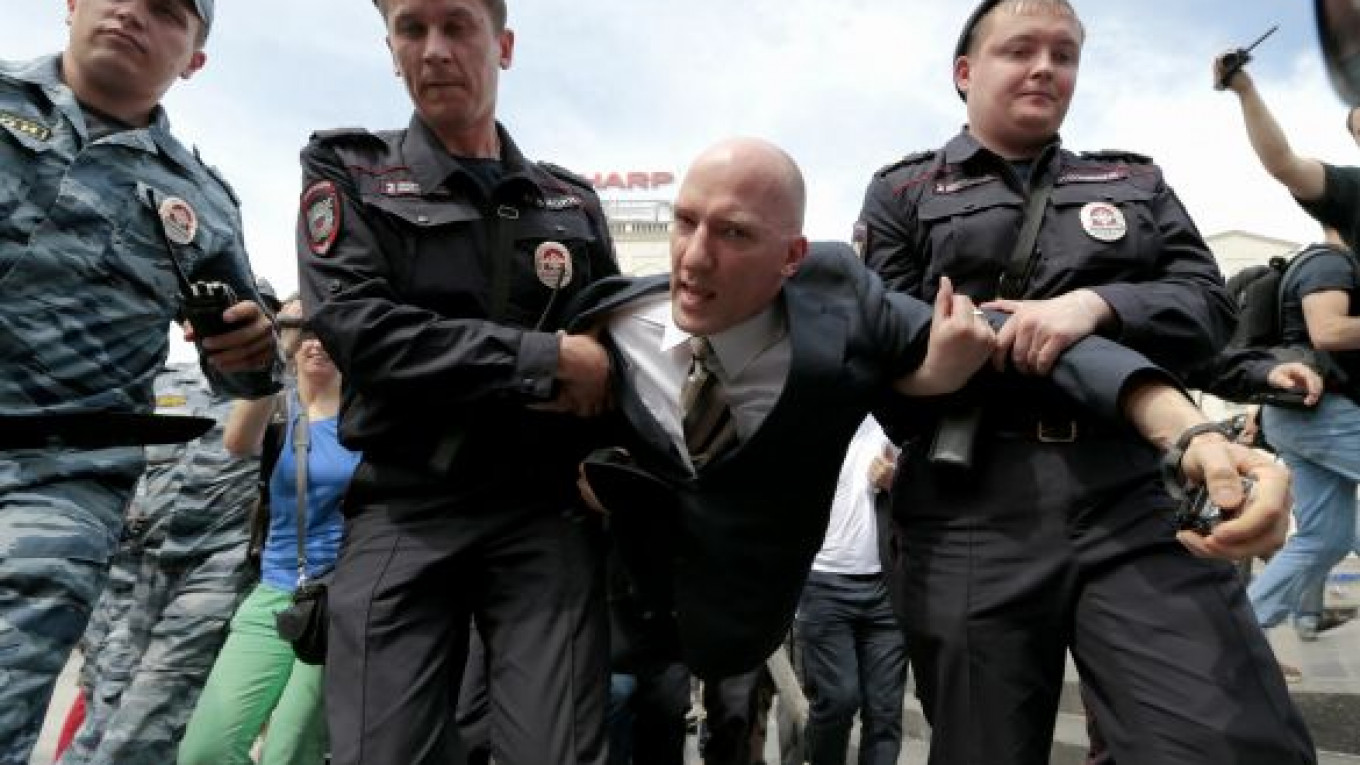Russian police detained about 30 pro- and anti-gay activists in central Moscow on Saturday, imposing the city's ban on gay rights demonstrations.
The arrests, underlining Russia's tough response to public demonstrations by gay groups, coincided with the first ever gay rally in neighboring Ukraine, which was allowed by the authorities and protected by the police.
Russia's parliament has given preliminary approval to a ban on "homosexual propaganda" targeting minors, which critics say would effectively ban gay rights demonstrations.
The legislation has prompted condemnation from abroad, but President Vladimir Putin has rejected that criticism, saying Russia did not discriminate against gay people.
Activists and Orthodox believers were detained for the unsanctioned rally on the same day Kiev held its first sanctioned gay rights rally.
Putin's traditional support base is among conservative voters, including Russian Orthodox followers, some of whom turned up to show their disapproval of Saturday's rally.
A few dozen gay rights activists gathered in front of the Duma building, as well as on a nearby square.
"It's an outrage that they didn't allow a gay parade … but I'm glad there weren't fights as in Georgia," said Alexander Asman, who described himself as a gay sympathizer and an observer, a few minutes before being hauled away by police.
There were minor scuffles as police swooped to detain protesters from both sides, but the mostly peaceful event avoided the large-scale violent clashes of gay rallies in Georgia and the Russian city of St. Petersburg earlier this month.
Protester Galina Kovtun, who was shaven-headed and wearing a pink T-shirt, described the actions of the authorities as "disgusting and unjust … There is such a thing as freedom of speech, after all: Article 31 (of the Constitution)," she added.
There were also small groups of anti-gay protesters, most wearing traditional Russian dress and religious symbols and chanting hymns and passages from the Bible.
"We are Orthodox believers, defending our Russian land, our traditions and our faith," said Marina Lovtsova, an elderly woman in a traditional head-scarf who was attending the counter-demonstration at the Duma.
"God doesn't allow Sodom and Gomorrah. We will make a stand until the last Russian person."
Despite Russia's constitutional guarantees of freedom of speech and assembly, Moscow authorities have repeatedly rejected annual requests by gay activists to hold a parade in the city.
Ukraine's First Gay March Held Under Police Protection
KIEV — About 100 Ukrainian gay rights activists held the country's first gay rally on Saturday, helped by police who arrested 13 people for trying to break up the march.
The activists walked for about 250 meters along Victory Avenue in the capital Kiev, while Orthodox Christian activists nearby chanted slogans denouncing them.
"Ukraine is not America. Kiev is not Sodom," shouted one anti-gay demonstrator over a loudspeaker.
A church activist broke through the police cordon briefly and slapped down banners calling for an end to discrimination against homosexuals before he was seized by police.
The march in Kiev lasted only 40 minutes but was a small victory for the former Soviet republic's gay community.
Organizers hailed the march on Saturday as a breakthrough.
"This event will go down in the history of Ukraine as one of the key developments in the fight for equal human rights," said Olena Semenova, one of the organizers, expressing gratitude to the police and the authorities for their action.
Ukraine's parliament last year shelved the second reading of a bill that would have criminalized the "promotion of homosexuality." But it has also delayed passing legislation to outlaw discrimination against homosexuals in the workplace.
(Reuters)
A Message from The Moscow Times:
Dear readers,
We are facing unprecedented challenges. Russia's Prosecutor General's Office has designated The Moscow Times as an "undesirable" organization, criminalizing our work and putting our staff at risk of prosecution. This follows our earlier unjust labeling as a "foreign agent."
These actions are direct attempts to silence independent journalism in Russia. The authorities claim our work "discredits the decisions of the Russian leadership." We see things differently: we strive to provide accurate, unbiased reporting on Russia.
We, the journalists of The Moscow Times, refuse to be silenced. But to continue our work, we need your help.
Your support, no matter how small, makes a world of difference. If you can, please support us monthly starting from just $2. It's quick to set up, and every contribution makes a significant impact.
By supporting The Moscow Times, you're defending open, independent journalism in the face of repression. Thank you for standing with us.
Remind me later.






